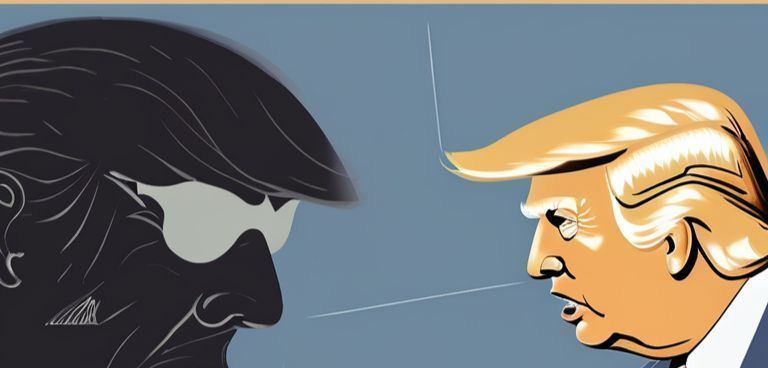The Battle for Ideas - Reinventing Politics and Media!
Uncover the clash of ideas: Deneen’s critique of liberalism’s erosion of societal foundations sparks a feisty conversation about the future of democracy and media.
Western democracy is challenged. Check the Labour party in Britain, Macron in France and the rise of the AfD in Germany. In the US, the Trump era has never been only about Trump. It has always been about ideas, about who gets to define America’s past, present, and future.
As Joshua Chaffin and Zusha Elinson reported in The Wall Street Journal (“The Ideological Gurus Battling for the Soul of Trump World,” May 9, 2025), the movement’s intellectual landscape is shaped by an unruly mix: nationalist-populists, libertarians, Catholic postliberals, and even the online counterculture that thrives on memes and irony.
At the heart of this ferment stands Patrick Deneen, the University of Notre Dame political theorist whose book Why Liberalism Failed (Yale University Press, 2018) jolted the academic and policy world. His argument was stark: liberalism has not been betrayed but pushed to its logical end. Its relentless focus on individual freedom and market forces, he argued, has eaten away at the communal bonds and civic trust on which societies depend. Sound familiar?
From Critique to Blueprint
Deneen’s follow-up, Regime Change: Toward a Postliberal Future (Penguin Random House, 2023), moved from diagnosis to prescription. He called for an “aristopopulist” alliance to replace today’s liberal elite with a new class guided by the common good and civic renewal. The aim, he wrote, was not violent overthrow but something “far more revolutionary”: a deep reorientation of institutions. Now, someone’s talking!
That phrase was picked up by Ian Ward in POLITICO (“‘I Don’t Want to Violently Overthrow the Government. I Want Something Far More Revolutionary,’” June 2023), where he framed it as the rallying cry of a growing insurgency. The core claim was that legitimacy cannot be restored by patching up the old liberal order, it requires a new one. And probably not the Keir Starmer kind of order…
And in his 2025 essay for UnHerd (“Why the MAGA-DOGE coalition will hold,” March 2025), Deneen extended the argument into electoral politics. The “MAGA” base and the libertarian-inflected “DOGE” digital right, he suggested, form a coalition of unlikely allies bound mainly by shared opposition to establishment liberalism. Ya think?
Who Is Patrick Deneen?
Patrick Deneen is a political theorist at the University of Notre Dame whose work has become a touchstone for America’s postliberal right. His 2018 book Why Liberalism Failed argued that liberalism doesn’t collapse from betrayal but from success, its emphasis on autonomy and markets eventually hollows out the civic trust that sustains society.
That argument struck a nerve in both academia and politics. Former President Barack Obama even recommended the book, calling it a serious challenge to liberal assumptions. But Deneen’s ideas have travelled farthest on the populist right, shaping the thinking of figures like Vice President J.D. Vance.
Vance has echoed Deneen’s themes of elite failure and the need for rooted communities. As The Wall Street Journal reported in May 2025, Deneen is one of several intellectuals whose critiques of liberalism now influence the ideological battles inside Trump World.
For supporters, Deneen offers a roadmap for civic renewal. For critics, his prescriptions risk sliding into illiberalism. Either way, his reach shows how arguments once confined to political theory seminars are now shaping debates in Washington.
What Is the MAGA-DOGE Coalition?
In his UnHerd essay, Deneen argued that two unlikely camps have fused into a durable political alliance.
MAGA stands for Donald Trump’s populist base: culturally conservative, working-class voters hostile to elites and traditional institutions.
DOGE is shorthand for a digital counterculture shaped by libertarian tech circles, meme culture, and online subversion. Tech bro’s ya know!
On paper, these groups seem incompatible. MAGA distrusts globalism and craves rooted community, while DOGE thrives on internet freedom and mockery of authority. Yet, Deneen contends, both share a deep resentment of establishment liberalism and a desire to upend the current order.
The coalition is less about policy than mood: populist anger meets digital disruption. In Deneen’s telling, it explains why Trump’s appeal endures and why the intellectual debates of “Trump World” now matter far beyond campaign rallies.
Politics’ Crisis Is Journalism’s Too
What does any of this have to do with the media industry? Quite a lot. Deneen’s critique of liberalism lands uncomfortably close to journalism’s own crisis.
For decades, the news business relied on a liberal consensus: objectivity, gatekeeping, a shared public square. That consensus has frayed. Legacy outlets no longer monopolise authority. News consumption has splintered into podcasts, Substacks, TikToks, and Twitter threads. AI now floods the infosphere with automated articles, synthetic audio, and hyper-targeted propaganda. Which means news is EVERWHERE!!
The result is a public mood that mirrors what Deneen sees in politics: exhaustion. “News ennui” is journalism’s version of postliberal malaise. Consumers are drowning in content, sceptical of institutions, yet still hungry for coherence.
Freedom Without Authority, Chaos Without Trust
In ‘Why Liberalism Failed’, Deneen argued that liberalism eventually dissolves its own foundations. By maximising freedom, it erodes the authority structures that make order possible. Journalism faces a similar paradox: in chasing reach, speed, and endless choice, it has undermined the trust that once made it viable.
The problem today is not scarcity of information but glut. In an AI-saturated ecosystem, stories no longer compete on accuracy but on virality. Deepfakes, spin, and algorithmic news blur truth and fiction. And just as postliberals argue that politics requires a new civic anchor, journalism must find its own ballast.
The Independent Journalist’s Dilemma
For independent journalists, the challenge is acute. They cannot outproduce AI, nor outspend platforms. What they can offer, if they adapt, is the kind of rooted authority Deneen thinks politics itself needs.
That starts with telling stories that cut through the noise. AI can churn out summaries, early drafts and surface-level content, but it cannot give readers the grounding that makes a story matter. Deneen’s influence comes not from daily commentary but from showing how today’s politics connects to older arguments. Journalists can do the same by offering context and meaning, not just headlines.
It also means thinking in terms of community rather than audience. Deneen’s postliberal vision stresses local ties and civic bonds, and journalism can take a similar lesson. Chasing clicks from strangers matters less than building loyal relationships with readers who trust your work. Membership-driven models, collaborative reporting, and slow journalism all point in that direction.
And finally, it’s about helping readers make sense of the flood. In a world drowning in content, people don’t need more information, they need guides. Independent journalists who can filter, frame, and explain the chaos will become indispensable, not as gatekeepers but as trusted navigators. So more like Sherpa’s, than ravaged drum-beaters.
LettsNews
The Letts Journal’s first official sponsor is LettsNews!
Sponsors keep content free for all - so you only become a paid subscriber if you want more from us. With enough sponsors and paid subscribers we can move from weekly to more regular cheeky, hard hitting coverage.
LettsNews offers newsroom tech for everyone - helping independent journalists, writers and PRs gather, publish and distribute news at the speed of light.
Sign up for FREE at LettsNews.com.
Media’s Postliberal Turn?
There is a clear symmetry here. Postliberal politics seeks to move beyond the exhausted liberal consensus. Journalism may need its own “postliberal turn”: a shift from the myth of detached objectivity toward rootedness, accountability, and narrative coherence.
This doesn’t just sound snazzy and doesn’t mean partisan capture or ideological conformity. It means accepting that journalism, like politics, cannot float free of community and purpose. Without that grounding, audiences will continue to drift, to influencers, to conspiracy entrepreneurs, to AI hallucinations.
A Future Still in Question
Deneen’s ideas remain contested. Critics accuse him of romanticising tradition, of underestimating liberalism’s resilience, of providing cover for illiberal populism. Yet his influence is undeniable: he has given shape to a mood of disenchantment.
Journalism faces the same mood. If audiences are tired of politics-as-usual, they are equally tired of news-as-usual. Independent journalists who ignore this risk are fading into irrelevance. Those who lean into it, who build trust, coherence, and community, may yet find themselves indispensable in an age of informational collapse.
Conclusion: Parallel Crises, Parallel Hopes
Politics and media are living through parallel crises of legitimacy. Both must grapple with the exhaustion of liberal assumptions (like the rest of us). Both must imagine new forms of authority without sliding into authoritarianism.
Rather than asking whether the old order has failed, Deneen argues that liberalism has already run its course. The real question, in his view, is what comes next. For journalists, that means asking whether they can be more than content providers. Can they become civic anchors in an atomised age?
If the answer is yes, then journalism’s regime change may not mark its end but its renewal.
References & Further Reading
Joshua Chaffin and Zusha Elinson, “The Ideological Gurus Battling for the Soul of Trump World,” Wall Street Journal, May 9, 2025.
Patrick Deneen, “Why the MAGA-DOGE coalition will hold,” UnHerd, March 2025.
Ian Ward, “‘I Don’t Want to Violently Overthrow the Government. I Want Something Far More Revolutionary’,” POLITICO, June 2023.
Patrick Deneen, Regime Change: Toward a Postliberal Future, Penguin Random House, 2023.
Patrick Deneen, Why Liberalism Failed, Yale University Press, 2018.
Keep up to date with The Letts Journal’s latest news stories and posts at our website and on twitter.




